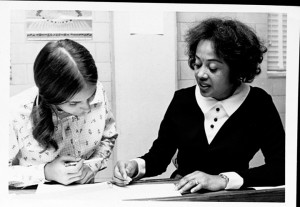
professor until her retirement in 1984. Mayes passed away in 1995 and would have been 82 this past week.
Photo Courtesy of the Texas Collection
Staff Writer
Historical civil rights figure Dr. Vivienne Malone-Mayes is still on the minds of professors this Black History Month, as she was an inspiration to many and the first African-American professor hired at Baylor.
Mayes was born in Waco in 1932 and grew up in Waco. She graduated high school at age 16 and went on to get her bachelor’s and master’s degrees at Fisk University in Nashville, according to files from the Texas Collection.
Mayes attempted to earn her doctoral degree at Baylor but was denied acceptance to the school because of her race. She went on to study at the University of Texas, where she became the fifth African- American woman in the U.S. to obtain a doctorate in mathematics.
Mayes was then hired at Baylor in 1966 as a full-time mathematics professor until her retirement in 1994. Mayes would have been 82 this past week. She passed away in 1995.
Dr. Ray Perryman, a president and CEO of the Perryman Group in Waco, and was one of Mayes’ mathematics students at Baylor.
“Vivienne was a huge inspiration in my life,” Perryman wrote in an email to the Lariat. “She was a civil rights advocate and leader and very different from anyone I had encountered before.”
Perryman said he and Mayes became close friends.
“She taught me that mathematics could be a thing of beauty — as much artistic as technical,” Perryman wrote. “She emphasized that any solution that was not ultimately simple and elegant was probably wrong.
“She also taught me the value of going back to the foundations of what I was working on rather than merely seeking to add on to the work of others. Those lessons have served me well throughout my career; her voice is in my head haunting me whenever I am working on any issues of substance or complexity.”
Robert Darden, associate professor in the journalism, public relations and new media department and founder of the Black Gospel Music Restoration Project, said Mayes was written about in African American and white newspapers alike as a hero of the integration movement of the 1960s.
“She was, at a very early age, a math prodigy,” Darden said. “She wasn’t even necessarily interested in being something like a martyr. She was just compelled to follow where her gift was taking her.”
Beluah Barksdale, a Waco resident, knew Mayes since the two were in kindergarten together in Waco and grew up with her to go on to Fisk University together and become Delta Sigma Theta sisters. Barksdale said Mayes was always goal-oriented, even as a child.
“Vivienne was always starting new things, like an investment club, library clubs and such,” Barksdale said. “She just always had things in mind.”
Barksdale said Mayes did face some discrimination through her education because of her race.
“Her determination was even greater at the University of Texas because they were not nice to her there,” Barksdale said. “She struggled with the professors. They could hardly believe she knew the things she knew, but she did know it.”
Perryman said Mayes didn’t let her students get off easily.
“If you had the soul of a mathematician, you would find her amazing,” he wrote in the email. “If you didn’t, I suspect that life was not so pleasant. We had an exceptional group of math students when I was at Baylor, many of whom have gone on to be highly successful. All of us took multiple classes from her and hung on every word. To the student who was merely checking a box on a degree plan, however, she was probably avoided like the plague.”
Dr. Baxter Johns, a professor in the mathematics department, began teaching at Baylor in 1971 and worked with Mayes. Johns said Mayes received a large grant for an experiment she spearheaded in math education.
“She was really interested in finding the best ways to teach students,” he said.
Dr. Ray Cannon, a former professor of mathematics, came to Baylor in the 1980s and said he knew Mayes as well. Cannon said Mayes was very ambitious in her work, especially in context of the time period with racial discrimination.
“As a black woman, she had to be driven,” he said.
Johns and Cannon said they agree that Mayes was admired by her colleagues at Baylor. Perryman said he would like to see a memorial erected in honor of Mayes.
“She was passionate about civil rights and brought out the very best in the better students that she encountered,” Perryman wrote. “I have been blessed with many honors and accolades in my career, but none that I cherish more than being asked to deliver a eulogy for her at her request.
“She was a remarkable woman who had a profound influence on many of Baylor’s best and brightest. I think that embracing and celebrating the sheer beauty of knowledge is one of the best things that any university can do, and Vivienne was the very embodiment of that spirit. That, to me, is her greatest legacy to Baylor.”



